Previously, we looked at some of the top storylines in men’s swimming for the upcoming Paris Olympic year. Now, we shift our focus to the biggest narratives on the women’s side.
Will The Aussies Continue Their Domination?
Right now, Australia is hands-down the top-performing nation in women’s swimming. This fact was true in Tokyo when the Aussies women won six individual gold medals and two of three women’s relays, and it became even more true at the most recent World Championships where they once again won six golds in women’s events and were responsible for four out of the seven world records broken at the meet (which includes the mixed free relay). Now, heading into Paris, the Aussies will have a major target on their back in several different disciplines.
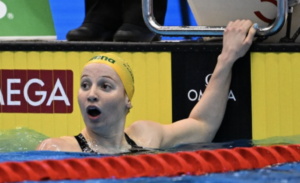
Mollie O’Callaghan by Fabio Cetti
Of course, Australia’s “golden trio” of Kaylee McKeown, Ariarne Titmus, and Mollie O’Callaghan hold most of the spotlight right now. All three swimmers broke world records in 2023—McKeown in all three backstroke events, Titmus in the 400 free, and O’Callaghan in the 200 free. However, don’t forget about the long list of several other swimmers that make Australia the swimming powerhouse that it is. This list includes Shayna Jack, the top relay performer at the 2023 Worlds; Emma McKeon, the most decorated female swimmer from the Tokyo Games; and names like Lani Pallister, Jenna Forrester, Meg Harris, Jenna Strauch, and Elizabeth Dekkers who saw big breakthroughs this Olympic cycle.
Oh and don’t even get us started on their relays. Australia’s 4×100 and 4×200 free relays will be heavily favored in Paris, and the medley relay could go in the Dolphins’ favor if Chelsea Hodges (who missed Worlds qualification in 2022 and missed 2023 World trials due to hip surgery) or another breaststroker is in the 1:05-point range again while the Americans have a leg that is off-form.
The question for Paris is whether the Australians will get the job done the way they did in Fukuoka and Tokyo (the 2022 Worlds in Budapest wasn’t their greatest meet, but they were also missing swimmers like Titmus and McKeon). Although Australian women are the favorites in multiple events, the only events that feel like a “lock” for them are the freestyle relays (though, you never know with that 4×200 race). In every other race, there will be challengers that have about just as much of a chance at winning gold as the Aussies do.
O’Callaghan might be the two-time defending World Champ in the 100 free, but Hong Kong’s Siobhan Haughey was the top performer of 2023. There’s a little bit more cushion in the 200 free where O’Callaghan and Titmus have 0.64 second on the rest of the World, but their biggest challenger, Canada’s Summer McIntosh, is just 17 years old and on a crazy improvement trajectory. McIntosh is a threat again to Titmus in the 400 free, being considerably younger than her and only 0.7 seconds slower. McKeown has been the queen of consistency in women’s backstroke since 2021, but America’s Regan Smith will always be looming behind (more on that later). In other words, there’s a path for everything to go right for the Aussies in Paris and it’s happened before, but there’s also the chance that everything falls apart and they end up with zero individual golds.
So far, many of Australia’s top international performances come from meets in Asia (Beijing 2008, Tokyo 2021, Fukuoka 2001/2023). But if the Aussies do as well in Paris as they did in Fukuoka and Tokyo, the notion that they perform better in countries closer to their time zone should be squashed. Regardless though, to solely credit time zone for this country’s success would still be undermining the sheer dominance of the Australian women—they’ve shown over and over again in this Olympic cycle that they are proven winners who have done things that no other country can match.
Can The Americans Find Their Groove Again?
Oftentimes in swimming, a tale of Australian success means a tale of American struggle, and this certainly is the case right now. To put things bluntly: the American women didn’t have their best World Championships showing this year, which coincided right with the dominance of the Australian women. And right now, the Americans are underdogs for the Paris Games.
As we said in our post-Fukuoka debriefing of Team USA, there are a lot of events that feel “out-of-reach” for the American women, such as the 50/100/200/400 free, 400 IM, the 200 breast if Evgeniia Chikunova swims it (more on that later), and the freestyle relays. And the lack of dominance exhibited by the American women isn’t just a 2023 thing—it happened in Tokyo too, when Ledecky and Lydia Jacoby were the only American women to come home with gold. However, there are several opportunities in every single event that we didn’t label as “out-of-reach” for the Americans, and they could absolutely win gold in these events if they swam fast at the right moment—which didn’t happen in Fukuoka.
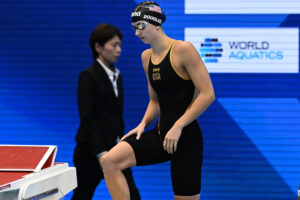
Kate Douglass by Fabio Cetti
Coming into Worlds, the expectations of American women compared to the men were very different. The men were a relatively inexperienced team and people didn’t anticipate them to do much, but rookies did more than they were predicted to do. However, on the women’s side, the majority of the team added a significant amount of time from their season-bests and didn’t perform as well as many thought they would. Regan Smith lost all three of her matchups to Kaylee McKeown and took bronze in the 200 fly, even though her season-bests in the 200 back and 200 fly would have won gold. Lilly King was a gold medal favorite in the 100 and 200 breast, but she finished off the podium in both events. The American butterfly contingent was so off the point that people questioned whether the U.S. women could win the medley relay that they were heavily favored to win heading into the meet.
That being said, the American women did have their bright spots. Katie Ledecky was dominant per usual in the distance free events. Kate Douglass, who is turning into the most unique swimmer in the world, won a world title in the 200 IM and a silver medal in the 200 breast in addition to being the United States’ fastest female sprint freestyler since Simone Manuel. In Paris, there will be a lot of pressure on Ledecky and Douglass to deliver–especially on Douglass, who is a major contender in long course for the first time in her life.
Right now, Ledecky is the only American woman favored to win anything in Paris. However, swimmers like King, Smith, Douglass, and Torri Huske absolutely have what it takes to pull off upsets against the favorites in their respective events. If they can get on their wall first in these tight matchups, they will see much higher gold medal numbers than they did in Fukuoka and Tokyo.
Summer McIntosh Could Make History
Over the last two years, Canadian 17-year-old Summer McIntosh went from a promising young talent to one of the best swimmers in the world. This year, she finished with two world records broken in the 400 free and 400 IM, world titles in the 200 fly and 400 IM, a world-leading time in the 200 IM, and a world junior record in the 200 free. In other words, she’s elite internationally in five different events and has the opportunity to etch herself into the Olympic history books.
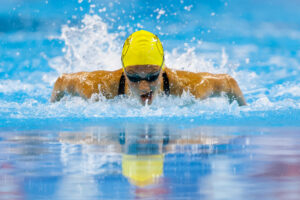
Summer McIntosh courtesy Michael P. Hall/Swimming Canada
McIntosh has more potential right now to win five individual gold medals at a single Olympic games than any other swimmer right now. If she pulls off this feat, she will become the first swimmer to do so, and the second overall swimmer after Michael Phelps did in 2008. If she wins four individual golds, she will be the fourth swimmer to do this after Phelps, Mark Spitz, and Kristin Otto.
So, what do McIntosh’s chances look like right now?
In the 400 IM, McIntosh is the heavy favorite to win. In the 200 fly, she’s the two-time defending World Champion, but Regan Smith has a faster personal best time than her. In the 200 IM, she’ll go into Paris as the top seed, but Kate Douglass, Alex Walsh, and Kaylee McKeown are not that far behind. Ariarne Titmus is currently half a second faster than her in the 400 free, but half a second doesn’t sound like a lot of time to drop as a 17-year-old. The 200 free will be the most difficult gold medal for McIntosh to claim, considering that her best time of 1:53.65 is 0.8 seconds behind Mollie O’Callaghan’s world record time of 1:52.85, but it’s certainly not unattainable.
There’s also the question of event schedules—will McIntosh be able to handle such a big event lineup and the double sessions that come with it? Will she swim all of her best events (at 2022 Worlds she dropped the 200 free, while she dropped the 200 IM at 2023 Worlds)? If McIntosh swims all five of her main events, then she will have to handle the 400 IM and 200 free final in the same session, with the 400 IM being the very first race of the night and the 200 free being the last race. That being said, the 200 free might just be the event she drops in Paris, considering that it’s her “worst” event and it conflicts with her best event.
It might seem like a lot to expect a 17-year-old girl to win four or five individual gold medals at an Olympic games, but it’s something that McIntosh is capable of doing, so it’s worth pointing out.
Smith vs. McKeown — Is This Even A Debate Anymore?
Ironically, the biggest rivalry in women’s swimming is also a very one-sided one.
We all know the story by now. Regan Smith exploded as a 17-year-old in 2019, becoming the first female swimmer to go 57 and 2:03 in the 100 and 200 back respectively. She was heavily expected to sweep the backstrokes in Tokyo, before COVID hit and moved the Olympics back a year. That allowed time for the rise of Kaylee McKeown, who took down Smith’s world record in 2021 and went on to sweep the backstrokes at the Olympics, while Smith took bronze in the 100 back but failed to qualify in the 200. The two swimmers didn’t meet in an out-of-wack 2022 year, but the rivalry came back in 2023. Headed into Worlds, McKeown was the top seed in both the 100 and 200 back, but Smith was close behind. Both Smith and McKeown were consistently going under 58 seconds in the 100 back in-season. McKeown was fresh off breaking the 200-back world record, while Smith had hit the 2:03-point mark for the first time since 2019. It was impossible to pick one over the other as a favorite—every backstroke race at the meet seemed like a toss-up.
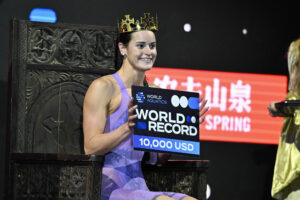
photo credit Marcus Chen Photography
However, at Worlds, all three women’s backstroke races resulted in the same thing: McKeown winning gold and Smith taking silver behind her. Three months later, McKeown broke the world record in the 50 and 100 back, making her the first female swimmer to break the world record in all three backstroke events. She hasn’t lost an individual backstroke race in four years and is now the world record holder, defending World Champion, and defending Olympic champion in all the backstroke disciplines—but for some reason, it’s so difficult to shake off the notion that she has a rival. And that’s understandable. When Smith is the first female to go 57 and 2:03 in the backstrokes, has beaten McKeown head-to-head on multiple relays, and is in the prime of her career, it’s hard not to consider her a rival, no matter how many times she loses to McKeown individually.
So we ask, what does Paris, the highly-anticipated next chapter of the Smith-McKeown rivalry, mean for both swimmers? For McKeown, it’s a chance to further cement her own legacy. She’s already accomplished everything there is to accomplish in swimming and proved that she can win when it matters the most, so back-to-back Olympic golds will just be the icing on top to further cement her legacy as one of the greatest backstrokers of all time, if not the greatest. However, for Smith, winning in Paris would be the way to fulfill the potential that she showed as a 17-year-old and check the most important box left on her resume—the box that she was expected to check easily back in Tokyo, but now has been made considerably more difficult due to McKeown’s greatness.
Yes, on paper, McKeown vs. Smith will still be expected to be a rivalry. But as the scale continues to tip in McKeown’s favor, the pressure will be on Smith to even things out before it’s too late.
Will Chikunova Get Her Chance?
Like on the men’s side, the presence of Russia at the Paris Games will shake up the landscape in women’s swimming. And it’s because of one swimmer: 18-year-old Evgeniia Chikunova.
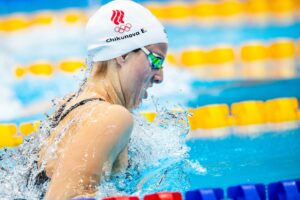
Evgeniia Chikunova (photo: Jack Spitser)
Chikunova is hands-down the best 200 breaststroker in the world, having crushed the world record in the event by 1.40 seconds this April. Her world record time of 2:17.55 would have won gold at the World Championships by over three seconds, but she could not compete due to Russia’s ban from World Aquatics events that had stood since Russia’s invasion of Ukraine in February 2022. She also finished the 2022-23 long course season ranked third in the world for the 100 breast (1:04.92), so she absolutely would have been in medal contention for the event at Worlds had she competed.
With World Aquatics announcing this September that they would approve of the participation of Russian and Belarusian athletes in international competitions if they competed as neutrals, the door has opened for Chuikinova to qualify for the Olympics and show off her breaststroke prowess against the rest of the world. The IOC hasn’t officially let Russians and Belarusians compete in Paris yet, but World Aquatics’ decision brings them one step closer. And that will change women’s breaststroke substantially.
If Chikunova is allowed to Paris, the 100 breast will still be competitive with the likes of defending world champ Ruta Meilutyte and Lilly King. However, the Russian teenager will be heavily favored to win the 200 breast. But if she’s not present in Paris, there will most certainly be an asterisk surrounding the 200 breast race—whoever wins (if they don’t go faster than 2:17.55 or whatever Chikunova’s best time is at the time) will win knowing that they aren’t truly the best 200 breaststroker in the world.

Paris will be the Kaylee, Summer & Mollie show.
My predictions for them. Which is better?
Kaylee 5 medals (3 ind, 2 relay)
100/200 back
200 IM
4×100 medley women’s/mixed
Summer 4 medals (all indv)
200 fly
200/400 IM
400 free
200 free not racing
4×100 free no medal
4×200 free no medal
4×100 medley not on team
Mollie 6 medals (2 ind, 4 relay)
100 free
200 free
4×100 free
4×200 free
4×100 medley women’s/mixed (Australia picks McKeown, ZSC, Temple, MOC)
Need to know the medal colours to decide which is better.
Most likely, Sarasota will send a team to US Open, so we’ll get some first ideas about Summer’s shape and trajectory this season in just a month. She recently looks taller than she was just few months ago in Fukuoka, so I’d say she has serious potential for significant drops in some of her events
Because I have nothing better to do on this Sunday morning, here’s my prediction for SwimSwam’s top 20 women. This is assuming there are no massive swims at US Open which could change things.
1 – Kaylee McKeown
3 world records this year, first to hold all backstroke records, first to sweep backstroke at worlds, 3 individual gold medal shots next year. Has proven she steps up when it matters.
2 – Summer McIntosh
2 world records this year, 2 golds, and arguably 4 individual gold shots next year. She could have been #1 again if she had swam at her best at worlds.
3 – Mollie O’Callaghan
Took down a legendary suited record, first to do the 100-200 sweep,… Read more »
Regan has been with Bowman a little over a year. She’s back at 2:03 just like that after 4 years of not being there. Marchand’s first year with Bowman was good, but the 2nd year was outstanding. This year so far he’s been 139 in backstroke. Who do you think he’s going head to head with: Regan and Kos and Marchand says she beats him and Kalicz in some backstroke sets. Just like Ledecky and Finke. They’re going head to head. On top of that, Regan doesn’t complain. You really can’t see anything when swimming backstroke except at the turn. You’re not turning your head looking at your competitors. You have to keep your head still and straight. Regan’s got… Read more »
Can’t see the Australians going backwards Emma was not in Toyko form at the world’s but will be in Paris . Molly and Arianne are too good and in their prime. Kayleen showed at the fina meets she is a superstar . Pallister is getting better and will be a factor in the 1500. With the return of our breastrokers from injury we can win the medley relay . Summer is the worry but she may opt for the butterfly and medley swims which won’t cut across our freestyle
Also watch out for Pallister in the 800.
Kaylee McKeown set 3 backstroke records this year and swept backstroke at worlds = “toss up with Regan Smith” (this is aimed at the comments not the article)
Kate Douglass won 1 event when her 2 biggest competitors weren’t entered and doesn’t even have the fastest time of the year = “guaranteed to win in a WR” (again about the comments not the article)
If Kate Douglass set 3 world records this year then the commenters on here would be frothing at the mouth with guarantees that she will win 10 olympic golds
Kaylee has been incredible this year, she is the best swimmer of 2023, there is no doubt, but I don’t think we should underestimate Kate Douglas, who had an incredible year, she demonstrated her incredible versatility in the long course, she joined her team behind her. being the best American this year.
As for his gold, the fact that Summer did not participate in 200 IM must not be underestimated, everything always happens for a reason and whoever wins is the best. THERE IS NEVER EXCUSE. Just like those who make excuses that if Regan Will return to such a form to devalue kaylee, he should not be played with and if Summer did such….
Find this all interesting with an understandable recency bias. However, isn’t it historically less than 50% of the current WC Gold medalists go on and win Olympic Games? Let’s forget about stupid Doha, and keep that in mind Fukuoka to Paris.
I actually think the statistics are WAY less than 50%.
for individual medalists, it’s 40% if you go back to 2003 and 33% if you stop at 2011.
This is true. But this year seems a little different. Kate Douglass is the only individual event winner who had never won a long course event before. Every single other individual Olympic event winner is a previous individual winner at either Olympics, World Champs or both.
There were no random newcomers to win an event, so I think the carryover will be higher than usual.
McIntosh Predictions:
200 FR- Chooses not to compete here.
400 FR- Gold (WR)
200 FL- Gold
200 IM- Gold
400 IM- Gold
If both Ruck/Oleksiak can come back to form, silver in the 4x200m FR relay. If only one does, then bronze. If none, then fourth.
I agree with most of this, but I think gold in the 200 IM may prove difficult because of KD. Sure, sure, “Todd’s watch” but going a 2:07 in practice is like a bat sign for an incoming world record, at least in my eyes.
It may prove difficult for KD to win Gold in Paris with Summer and Kaylee likely in the race unlike Fukuoka.
Summer swam PBs in both her 200 events at worlds. If you’re assuming KD is about to drop time you really have to assume the same about Summer
You should know by know that only American swimmers can improve. It’s decided by God.
It is impossible for swimmers from other countries to improve even if they are a lot younger.